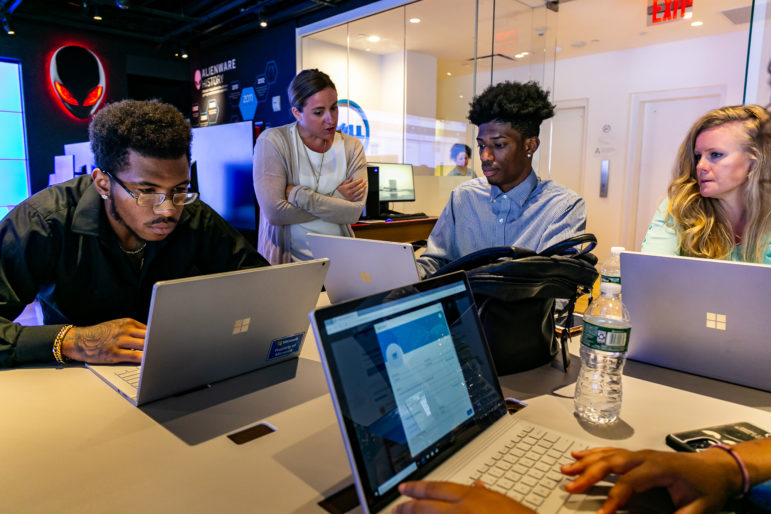‘Investing in mentorship is not just a moral imperative. It is a wise business decision. Bringing in young people disrupts group think, provides a diversity of opinions, develops our future workforce, and yields economic benefits.’

Adi Talwar
A youth internship workshop hosted by the city in 2018.Over a year after the first COVID-19 cases were confirmed in the Empire State, the city’s under-represented youth continue to bear the brunt of this radically unequal recession. Largely caused by a history of inequity and lack of inter-generational mobility that exists due to systemically segregated communities, youth face an opportunity gap in access to upwardly mobile careers. Faced with learning loss and the negative impacts of isolation, they are set to experience significant delays developing social-emotional skills and accessing social capital critical to career growth.
Having worked for more than 25 years in New York City’s youth and workforce development spaces, I can attest that what is missing from the current systems to make the city more equitable is mentorship.
It’s evident— the success of New York’s future leaders depends on commonsense policies that can amass bipartisan support and leverage our connections to one another to benefit young people. A mentorship initiative with incentives for business participation will accomplish what is needed. The value of these connections between generations of New Yorkers is a core component for our city’s economic recovery.
 CityViews are readers’ opinions, not those of City Limits. Add your voice today!
CityViews are readers’ opinions, not those of City Limits. Add your voice today!
Mentors are uniquely positioned to connect youths to their networks. This is especially important for young people who reside in “high-unemployment areas” where there are fewer adults who can make introductions to expand career awareness and job prospects. Unfortunately, a national study shows, one in three young adults lack access to a mentor of any kind. It’s a problem that can be solved and New York City is uniquely positioned to deliver a viable, cross-sector solution.
By bringing together business leaders, policymakers and leading nonprofits focused on mentoring, we can tap into the tremendous human capital in New York City’s underrepresented youth.
The organization I lead, Big Brothers Big Sisters of New York City (BBBS of NYC), knows the potential of mentorship’s role in advancing equity and economic mobility. Our proposed For Every Sector, A Mentor initiative outlined in our recent white paper addresses how a three-year mentorship program can break the cycle of corporations’ homogenous talent pools while giving youths opportunities and experiences to navigate their career paths.
In preparing for the city’s recovery, we must prioritize our next generation of leaders.
First, we should build a coalition of mentorship providers and engage Business Associations and Business Improvement Districts (BIDS). Through this type of network, the city can capitalize on general youth mentoring organizations, like BBBS of NYC, and those with a specific focus, such as LGBTQ+, gender specific, or immigrant youth, to create a more inclusive initiative.
Next, I urge the New York City Council to explore policies that would authorize BIDS and Business Associations to fund a pilot program through taxes or membership fees they collect. Federally, we must also expand the types of companies held accountable to the Community Reinvestment Act beyond financial institutions, and clarify provisions of the law to ensure Work Based Learning opportunities and mentoring programs qualify.
We can’t expect youth to work for free. They must be compensated to build pride, feelings of empowerment and engagement. To achieve this, we should allow participating companies to take tax deductions on stipends for youths. Doing so will ensure that young people can be paid and fully participate in the multi-year program without having to work an additional part-time job.
Finally, we must develop a system to encourage continued investment from companies into the community and create a city-wide “Dollars for Hours” program that turns employee volunteer hours into tax-deductible grants for nonprofits. Allow companies who commit to the full three-year program to receive some forgiveness of capital gains taxes for the period of time they participate.
Investing in mentorship is not just a moral imperative. It is a wise business decision. Bringing in young people disrupts group think, provides a diversity of opinions, develops our future workforce, and yields economic benefits. Research shows that every dollar invested in social emotional learning provides an $11 return. By comparison, supporting a disconnected young adult costs approximately $16,000 per year. In addition, keeping young adults connected and engaged has the potential to generate more than $4,000 per young person in New York City and State tax revenues.
As we focus on the city’s recovery, a core tenet of our focus must be the future of our youth. By creating an initiative with shared accountability between policy makers, the private sector and a coalition of expert mentoring organizations, New York City can position itself as a leader in generating economic mobility through mentorship.
Alicia Guevara is the chief executive officer of Big Brothers Big Sisters of New York City, the nation’s first and city’s largest mentoring program, serving more than 5,000 young people in all five boroughs.







